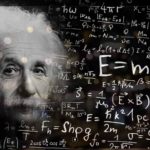Albert Einstein’s warning about college education: “Education is not the learning of facts, but the training of minds to think. It’s a miracle that curiosity survives formal education”

Albert Einstein was a German-born American theoretical physicist. He is considered the most well-known and popular scientist of the 20th century. He might even be the most famous scientist and arguably one of the most intelligent people to have ever lived. He was born at Ulm, in Württemberg, Germany, on March 14, 1879.
He became a German citizen in 1914 and remained in Berlin until 1933 when he renounced his citizenship for political reasons and emigrated to America to take the position of Professor of Theoretical Physics at Princeton. In 1921, he won the Nobel Prize in Physics. He later became a United States citizen in 1940 and retired from his post in 1945.
While Einstein is best known for his mass-energy equivalence formula E = mc2, dubbed “the world’s most famous equation.” In addition, he also developed the ground-breaking theory of relativity which is one of the two pillars of modern physics. Today, Einstein’s work is also known for its influence on the philosophy of science.
It’s no doubt that Einstein was a gifted mathematician and physicist. At the age of 12, he taught himself algebra and Euclidean geometry over a single summer. Einstein also loved music. He once said, “If I were not a physicist, I would probably be a musician. I often think in music. I live my daydreams in music. I see my life in terms of music.” His passion for mathematics led him to become convinced that nature could be understood as a “mathematical structure.”
While commenting on college education during his visit to Boston in 1921, Einstein said, Education is not the learning of facts, but the training of minds to think.” He argued that in order to learn facts, a person does not really need a school or college education.
Einstein went on to explain that the value of any school or college education is to” train the mind to think something that cannot be learned from textbooks, it is to create the capacity of integrated understanding and an ability to use the knowledge intelligently.” Today, educators and teachers no longer teach students to think for themselves but instead tell them what think. In 2018, the United States performed worse than Lithuania and Vietnam in Mathematics on international testing. It’s commonly argued that the US education system is modeled on factories and not skills required for students to survive in the 21st century.
Although critical thinking is the cornerstone of science, philosophy, and a functioning society, it is no longer being taught or embraced in our academic institutions. Instead, they are shunned and anyone with opposing views is undermined, discredited, and labeled as racist and insensitive of others. Long gone are the days of objective truth. What’s true for you may not be the truth for me. Everything is now relative.
So fifteen years after his message in Boston, in 1936 Einstein composed an essay in German that was published in English in 1956 under the title “On Education.” The essay was part of an address by Albert Einstein to the State University of New York at Albany, on the occasion of the celebration of the tercentenary of higher education in America, October 15, 1936.
Einstein started out by saying, “Thus, there is nothing else left for me but to speak about such questions as, independently of space and time, always have been and will be connected with educational matters. In this attempt I cannot lay any claim to being an authority, especially as intelligent and well-meaning men of all times have dealt with educational problems and have certainly repeatedly expressed their view clearly about these matters. From what source shall I, as a partial layman in the realm of pedagogy, derive courage to expound opinions with no foundations except personal experience and personal conviction? If it were really a scientific matter, one would probably be tempted to silence by such considerations.”
“Education is what remains after one has forgotten everything he learned in school. It’s a miracle that curiosity survives formal education,” Einstein said.
He went on to say, “However, with the affairs of active human beings it is different. Here, knowledge of truth alone does not suffice; on the contrary this knowledge must continually be renewed by ceaseless effort, if it is not be lost. It resembles a statue of marble which stands in the desert and is continually threatened with burial by the shifting sand. The hands of service must ever be at work, in order that the marble continue lastingly to shine in the sun. To these serving hands mine shall also belong.”
He then expressed his view of the education of his days saying, “The school has always been the most important means of transferring the wealth of tradition from one generation to the next. This applies today in an even higher
degree than in former times, for through modern development of the economic life, the family as bearer of tradition and education has been weakened. The continuance and health of human society is therefore in a still higher degree dependent on the school than formerly.”
Echoing the view that knowledge is dead and school is alive, Einstein disagreed that school should be used as an “instrument of transferring a certain maximum quantity of knowledge to the growing generation.” Einstein said that’s not the right way. Instead, Einstein said the goal “must be the training of independently acting and thinking individuals, who, however, see in the service of the community their highest life problem.”
“Sometimes one sees in the school simply the instrument for transferring a certain maximum quantity of knowledge to the growing generation. But that’s not right. Knowledge is dead; the school, however, serves the living. It should develop in the young individuals those qualities and capabilities which are of value for the welfare of the Commonwealth. But that does not mean that individuality should be destroyed and the individual becomes a mere tool of the community, like a bee or an ant. A community of standardized individuals without personal originality and personal aims would be a poor community with no scope for development. On the contrary, the aim must be the training of independently acting and thinking individuals, who, however, see in the service of the community their highest life problem.”
He then concluded with this idea of what he called the “wit.” Einstein said that “the wit was not wrong who defined education in this way: “Education is that which remains if one has forgotten everything he learned in school.”
He added, “For this reason, I am not at all trying to take sides in the struggle between the followers of the total philologic-historical education and the education more devoted to natural science.” You can read the rest of the essay in the PDF document below.
Meanwhile, Einstein was not alone. In March 1974 Isaac Asimov published “How to Write 148 Books Without Really Trying” in the journal “Chemtech” from the American Chemical Society. In 1975 the essay was updated and became “How to Write 160 Books Without Really Trying” which appeared in Asimov’s collection “Science Past, Science Future.” In one of his writings, he said, “And self-education is, I firmly believe, the only kind of education there is.” Asimov went on to say that “the only function of a school is to make self-education easier; failing that, it does nothing.”
“I also read voluminously and omnivorously in science and history, which not only made subsequent classwork easier but also early developed in me the habit of self-education. And self-education is, I firmly believe, the only kind of education there is. The only function of a school is to make self-education easier; failing that, it does nothing.”
In closing, below is a related video that examines how public schools and the mainstream media have contributed to the growth of a passive citizenry, thus paving the way for the rise of tyranny. The video also looks at the role anti-authoritarians play in a free and flourishing society. Enjoy!

